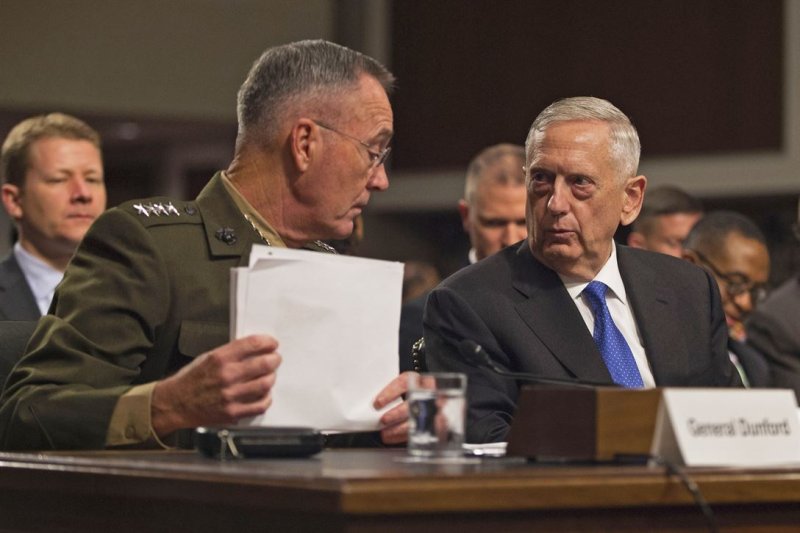Defense Secretary Jim Mattis (R) and Marine Corps Gen. Joe Dunford, chairman of the Joint Chiefs of Staff, testified Thursday to the House Appropriations Defense subcommittee that President Donald Trump's military budget proposal for 2018 is required to maintain military readiness and the advantages the U.S. military has over other nations. Mattis and Dunford are pictured during testimony to members of the Senate Armed Services Committee in Washington D.C., on June 13, 2017. Photo by Army Sgt. Amber I. Smith/Department of Defense/UPI
June 15 (UPI) -- Secretary of Defense James Mattis and Chairman of the Joint Chiefs of Staff Marine Corps Gen. James Dunford spoke in support of the president's fiscal 2018 defense budget while before the House Appropriations Defense subcommittee.
Both leaders argued that the Budget Control Act of 2011, also known as sequestration, needed to be repealed due to erosion in defense competitive advantage and readiness.
"There's no room for complacency in the Department of Defense, and we have no God-given right to victory on the battlefield," Mattis told the panel.
"We need bipartisan support for this request," he said. "In the past, by failing to pass a budget on time, or to eliminate the threat of sequestration, Congress sidelined itself from its active constitutional oversight role."
Mattis was shocked at the low state of the military's readiness when he returned to the department in January -- 16 years of war, a worsening international security environment and technological competition demanded stable budgets, he said.
The defense secretary asked that Congress fully and promptly fund the president's request to avoid another continuing resolution.
Dunford testified that even the president's request, which called for a three percent increase in the budget, would only stop erosion in readiness and not acknowledge the needs the military would have in the future. "We assess it will take many years to get out of the situation," he said.
Dunford said three percent growth above inflation for a number of years would be necessary to maintain the advantage the U.S. military has today.
"That's not just to build the force we need for the future, but to maintain the force we have today," he added.















